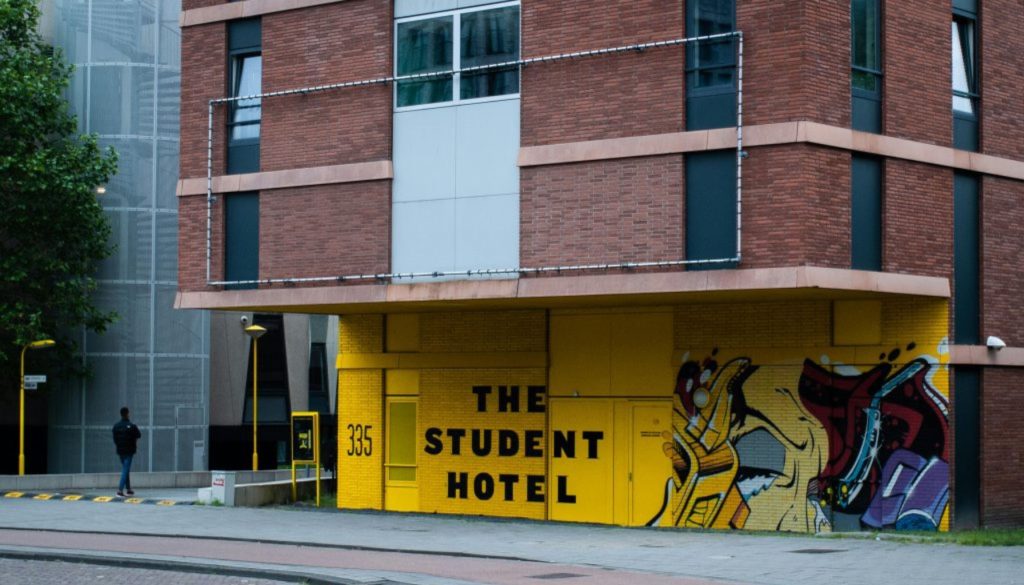
As experts in UK education consulting, we at UK Study Connect understand that choosing the right accommodation is one of the most pivotal decisions a student can make when pursuing their studies in the United Kingdom. The right living situation can significantly impact your academic experience, well-being, and satisfaction while studying abroad.
This comprehensive guide will delve into the various types of student accommodation available, including university halls of residence, private student housing, host families, and flat-sharing options. We will discuss the benefits and drawbacks of each option, considering factors such as location, amenities, cost, and social atmosphere.
Moreover, we will provide valuable tips on assessing your needs and preferences, ensuring you find a living space that aligns with your academic pursuits and lifestyle. By balancing comfort, convenience, and affordability, we aim to help you make an informed choice that will contribute positively to your educational journey in the UK.
Understanding Your Student Accommodation Options
University Halls of Residence
University halls remain the preferred accommodation for first-year students, and several compelling reasons exist for this trend. According to recent statistics from UCAS, in partnership with Kight Frank, approximately 63% of first-year students opt for this housing arrangement.
One of the primary advantages of university halls is the sense of community they foster, allowing students to easily connect with peers experiencing similar transitions.
Additionally, halls often provide essential services, such as on-site dining options, study spaces, and recreational facilities, which can significantly enhance a student’s university experience.
Furthermore, living in university halls typically offers a convenient location, close to lecture halls and campus resources, making adjusting to university life smoother and more enjoyable.
Overall, university halls are vital to the UK student housing landscape, providing practical support and social opportunities for newcomers.
Advantages of University Halls:
- Convenient location on or near campus
- All-inclusive billing (utilities, internet, and often basic insurance)
- Built-in social environment
- 24/7 security and support staff
- Easier transition to university life
Cost Considerations:
The cost of university accommodation varies significantly by location and room type. Based on Save the Student’s Accommodation Survey 2024, average weekly rents range from:
- London: £175-£250
- South East: £150-£200
- Midlands: £125-£175
- North: £100-£150
Private Student Halls
Private halls have grown increasingly popular. They offer modern facilities and often a more luxurious living experience. Companies like Unite Students and iQ Student Accommodation manage properties across major UK cities.
Key Features:
- Modern amenities (gym, study spaces, social areas)
- Professional management
- All-inclusive bills
- Choice of room types
- Central locations
- Accessibility, especially for students with disabilities.
Cost Range:
Private halls typically cost 15–30% more than university accommodation, with prices varying by location and facilities offered.
Private Rented Houses (HMOs)
Houses in Multiple Occupations (HMOs) offer a more independent living experience. According to the UK Government’s Housing Statistics, approximately 30% of students choose this option after their first year.
Benefits:
- More independence
- Often more spacious
- Usually more affordable per person
- Choice of housemates
- Real-world living experience
Important Considerations:
- Requires managing bills separately
- Need to understand tenant rights and responsibilities
- May need a UK-based guarantor
- Additional costs (deposit, agency fees)
- Accessibility for students with disabilities.
Studio Apartments
Studio apartments are an exceptional choice for student accommodation for individuals prioritising privacy and independence. These self-contained living spaces appeal to many, combining living, sleeping, and kitchen areas into a single room, allowing for a more intimate and personal environment.
According to Rightmove, studio apartments are becoming more popular among international students. This trend suggests that many students gravitate towards accommodations that provide comfort and the chance to live independently, reflecting their desire for a more personalised living experience during their studies abroad.
In addition to Rightmove, SpareRoom is another prominent accommodation service recognised as one of the largest flatmate-finding platforms in the UK and globally. This user-friendly service is free, allowing anyone to create and post ads without charge.
SpareRoom users can also contact all bold ads (highlighted in blue) and other free ads (highlighted in grey) that have been active for more than seven days, making it easier to find suitable living arrangements.SpareRoom is particularly well-known for its studio listings and shared accommodations.
Typically, studios featured on SpareRoom include a well-furnished double bedroom, complete with a spacious double bed to ensure comfort. Many listings also provide dedicated study space, ideal for students or professionals who need a quiet area to work. Additionally, the accommodations offer a generous amount of storage space, allowing residents to keep their belongings organized and accessible.
Accessibility
SpareRoom is highly recommended for individuals seeking shared living arrangements or studio apartments. It provides a diverse array of choices tailored to various needs and preferences. This platform is particularly useful for students who may be looking for affordable housing options in university towns or cities.
However, if you are a student with disabilities, it is essential to verify that the accommodation includes all necessary accessibility features that comply with UK standards for independent living, whether such accommodation was secured through SpareRoom or any other accommodation service. These features may include accessible entryways, spacious layouts for ease of movement, and adapted bathroom facilities, among others.
To ensure that the living space meets your specific requirements, it is recommended to thoroughly inspect the room in person before making any financial commitments. This allows you to assess the space for accessibility and comfort, making informed decisions about your housing situation. Always prioritize your independence and well-being when choosing a place to live.
SpareRoom’s Monthly Free Accommodation Contest
When you sign up for SpareRoom, you become eligible to participate in an exciting monthly draw to win free accommodation for an entire month. You’ll need to follow some simple steps to enter this contest.

First, check your email, as you will receive a unique link each month. After receiving the link, share it on your social media channels—such as Facebook, Twitter, or Instagram—and also email it to your friends and family.
Sharing this link increases your chances of winning the monthly draw. Don’t miss out on this fantastic opportunity to secure a month of free living!
Advantages of Studios:
- Complete privacy
- Self-contained living space
- Suitable for couples
- Often modern facilities
- Flexibility in location
Cost Implications:
Studios are typically the most expensive option, with monthly costs ranging from £800 to £1,500, depending on location.
Location Considerations For Student Accommodation
City Centre vs. Suburban Areas
The choice between city centre and suburban accommodation depends on various factors:
City Centre:
- Higher costs
- Better access to amenities
- Shorter commute
- More vibrant atmosphere
Suburban:
- Lower rental costs
- Quieter environment
- More spacious options
- Longer commute times
Transport Links
We recommend considering the following when evaluating location:
- Distance to campus
- Public transport accessibility
- Walking and cycling routes
- Night transport options
- Transport costs
Making Your Decision

Factors to Consider When Choosing Student Accommodation
- Budget
- Accommodation costs
- Additional expenses
- Living costs in different cities
- Location
- Distance to university
- Local amenities
- Safety of the area
- Transport links
- Personal Preferences
- Desired level of independence
- Social aspects
- Study environment
- Required facilities
Tips for International Students
As specialists in international education, we recommend international students consider:
- Arrival Timing
- Book accommodation before arriving
- Arrange temporary accommodation if needed
- Consider early arrival for orientation
- Documentation
- Prepare proof of student status
- Arrange UK guarantor service if required
- Understanding tenant rights
- Cultural Considerations
- Mixed or single-gender accommodation options
- Dietary requirements (kitchen facilities)
- Prayer rooms or religious facilities nearby
Financial Planning
Understanding Costs for Student Accommodation
Upfront Costs:
- Deposit (usually 4-6 weeks’ rent)
- First month’s rent
- Agency fees (if applicable)
- Insurance
Monthly Costs:
- Rent
- Utilities (if not included)
- Internet (if not included)
- Contents insurance
- Transport
Funding Options
- Student Finance
- Maintenance loans
- Grants and bursaries
- University-specific scholarships
- International Student Support
- Country-specific scholarships
- University international funds
- Government sponsorships
Legal Considerations for Student Accommodation
Tenant Rights
According to the UK Government’s Housing Rights Guide, students should be aware of:
- Deposit protection schemes
- Minimum property standards
- Repair responsibilities
- Notice periods
Safety Standards
All student accommodations must meet the following:
- Fire safety regulations
- Health and safety standards
- HMO licensing requirements
- Electrical safety certificates
Key Takeaways
- Start your accommodation search early, ideally 6–8 months before your course begins.
- Consider all costs, not just the basic rent
- Research the local area thoroughly
- Understand your legal rights and responsibilities
- Keep transport links and commute times in mind
- Balance social aspects with study requirements
- Ensure all safety and security measures are in place
Frequently Asked Questions
Q: When should I start looking for student accommodation?
A: We recommend starting your search 6-8 months before your course begins, especially for university halls and private student accommodation.
Q: Do I need a UK guarantor?
A: Most private rentals require a UK guarantor. International students can use guarantor services like Housing Hand or pay several months’ rent in advance.
Q: What’s included in “bills included” accommodation?
A: It usually covers water, electricity, gas, and the Internet. Always check the specific inclusions, as they can vary.
Q: Can I view accommodation before booking?
A: Yes, most providers offer virtual tours, and in-person viewings can be arranged. University accommodation often has open days.
Q: How long are typical student tenancy agreements?
A: Most contracts run for 42-51 weeks, with some university halls offering shorter terms aligned with academic years.
Additional Resources
- UCAS Accommodation Guide
- NUS Housing Advice
- UK Council for International Student Affairs
- Student Room Accommodation Forum
Conclusion
Finding the right student accommodation is critical in ensuring a positive experience while studying in the UK. This process requires careful consideration of various factors that can significantly impact your daily life as a student. Key aspects to evaluate include your budget, the location of the accommodation, your personal preferences regarding amenities and living arrangements, and any practical requirements you may have.
Budget is often one of the primary considerations when choosing student housing. It’s essential to clearly understand your finances, including tuition, living expenses, and additional costs, to determine what you can afford. Make sure to account for utilities, internet, and other potential fees that might not be included in the initial rent.
Location is equally important. Consider how close the accommodation is to your university, public transport links, grocery stores, and other essential services. A convenient location can save you time and money, so think about your daily commute and how accessible key locations are from your potential home.
Personal preferences play a significant role in finding the right fit. Some students prefer a quiet and private environment, while others seek a more social atmosphere. Consider whether you want to live in shared accommodation or a studio and the importance of amenities like laundry facilities, study spaces, and communal areas.
Practical requirements should also be considered. Consider any specific needs you might have, such as accessibility features, pet policies, or dietary preferences related to kitchen facilities.
At UK Study Connect, we aim to provide you with a comprehensive guide to navigate these considerations and help you make an informed decision about your student housing in the UK. Remember, the perfect accommodation balance is unique to each individual, so take the time to reflect on what is most important to you.
For personalised advice on student accommodation or any other questions regarding studying in the UK, please don’t hesitate to contact our expert team. We are committed to assisting you in making your study experience in the UK as smooth, enjoyable, and successful as possible.

